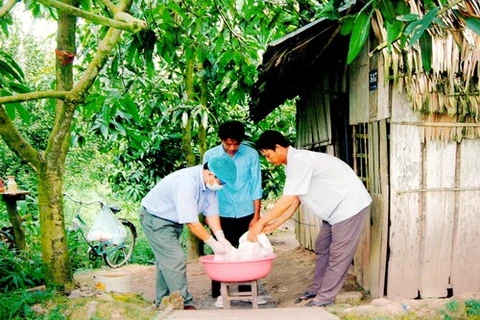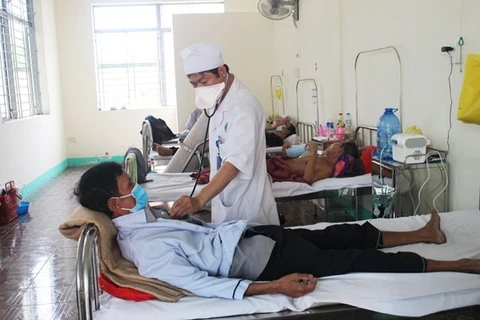 Some 30 per cent of patients at the National Children’s Hospital (NCH) suffer from drug-resistant bacteria stemming from improper use of antibiotics.(Source: VNA)
Some 30 per cent of patients at the National Children’s Hospital (NCH) suffer from drug-resistant bacteria stemming from improper use of antibiotics.(Source: VNA)Hanoi (VNA) - Some 30 percent of patients at the National Children’s Hospital (NCH) suffer from drug-resistant bacteria stemming from improper use of antibiotics.
Doctors are warning parents against buying medicines for their children without doctors’ prescription. Besides living environment or antibiotic residues in food, dosing without consulting a doctor is the main reason for drug resistance.
NCH examines about 4,000 patients and treats 1,700 inpatients a day. Among them are 300 children using medical ventilators and oxygen concentrators, and 70 to 80 patients with catheters. Most of the inpatients were transferred from provincial facilities with these medical devices, increasing the high risk of hospital-acquired infection.
Hospital-acquired infections are getting worse, according to Tran Minh Dien, vice director of NCH. “Many patients transferred to our hospital have antimicrobial resistance. Therefore, we have to identify cases of hospital-acquired infection to offer suitable treatment regimens,” said Dien.
Antimicrobial resistance causes difficulties in treatment. Doctors and microbiologists have collaborated to manage antibiotics used in treatment to control the consequences of antimicrobial resistance.
Infection control and proper antibiotics usage are key factors to prevent hospital-acquired infection, according to Dien.
“Doctors need to practice good screening and isolation. Medical staff and patient relatives, additionally, have to obey the procedure of sanitising to prevent infection,” he said. “In addition, doctors should be aware of proper antibiotics usage. Every six months, the hospital issues microbial reports for doctors to develop decent medical regimens.”
Bacteria generally develop gradual resistance to a drug over a ten to 30-year period, but the misuse and overuse of antibiotics shortens this process.
Parents and doctors are advised not use antibiotics for every cold and cough, and only when patients suffer from infections - and even then, a modest dose. They should stop taking antibiotics longer than necessary or ending the course too early.
Overuse of antibiotics can allow bacteria to change in some way that either protects them from the action of the drug or neutralises the drug. On other hand, stopping using antibiotics too soon may create favorable conditions for bacteria to revive and become resistant from drugs.
Antimicrobial resistance causes about 700,000 deaths per year globally, according to a report by the World Health Organisation (WHO). Ten million people will die annually by 2050 if the problem is not curbed.
In August 2017, Vietnam adopted a National Action Plan to tackle the overuse of antimicrobials in livestock and fisheries in an effort to control antimicrobial resistance.-VNA
VNA






















